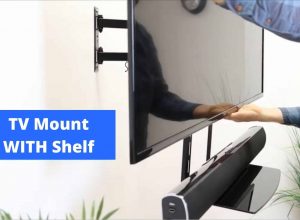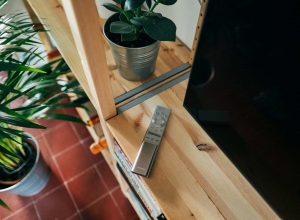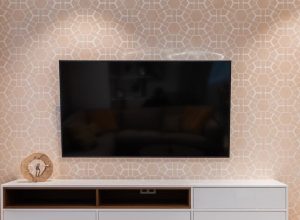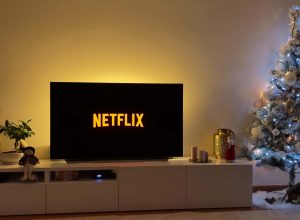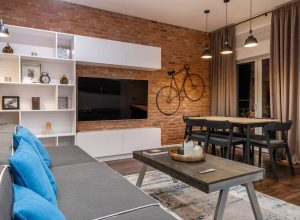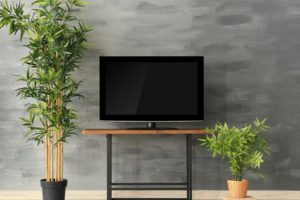A wall-mounted TV can be a perfect addition to your living room. But, trust us when we tell you, proper placement of your flat screen can have a huge effect on your TV performance.
If you place your TV in the wrong place it may affect both the sound and picture quality.
Quick summary
In this post we will go over:
- Where to mount your TV screen?
- How high you should mount your TV?
- What not to do while mounting your TV?
Let’s get started.
Where to Mount your TV screen?
Before we decide the ideal height for your flat-screen TV, there are some factors you need to consider first:
TV Size

Before anything, carefully measure your TV so it properly fits into your wall mount. This will ensure that the TV mount is securely attached to the wall.
Generally speaking, if you have a wider TV, we would suggest you mount it higher than the normal height. This is done to balance the extra space it takes up to create a perfect viewing angle.
Optimal Viewing Distance and the Size of the Room

The next thing you need to do is think about the size, layout, and design of the room.
Ask yourself:
- How wide is the wall where the TV is to be mounted? What will the viewing angle be?
- What is the wall material?
- Are the walls sturdy enough for wall mounting?
- How far is the sitting area?
- What will be the direction of the flat-screen TV? Will the screen glare be an issue?
- Are there electric outlets near the TV?
Viewing distance is another factor that will make or break the viewing experience. If you’ve placed your TV too far from the couch, that might give you a feeling of inattentiveness. Whereas, watching TV from too close may cause headaches and eyestrain.
How High Should I Mount my TV?
There is no set height for mounting a TV. Ideally, you wouldn’t want your TV too high. For the best entertainment experience, you want the center of the TV to be at your eye level or lower.
There are several factors that go into how to determine your eye levels such as the height of the couch and the distance from the couch and the flat-screen television.
In addition, the most action that happens on a TV is in the center third of the TV screen. So, this is where you need to have your eye level.
For example, if your TV height is 30 inches, the ideal eye level would be at the middle 10 inches. But, this will also depend on how much plastic framing is around the screen from the TV center.
How to Mount your Flat Screen TV at the Perfect Height?

We recommend you recruit the help of at least two friends for this process.
Next, sit on your favorite spot and have your friend raise the TV until it feels just right to you.
Tip: Have your friend start low and slowly raise the TV so you have time to decide the perfect screen height.
Once you’ve figured out the mounting height, mark the wall and calculate the wall mount placement from there.
Of course, there are a number of formulas you can follow for this process, but at the end of the day, it’s about your personal preference and where you feel comfortable.
What calculations do I need to mount my TV on the Wall?
To calculate the perfect viewing distance and height is to take the size of the TV and divide it by 0.55.
As a quick reference, a 42 inch TV needs to be mounted 56 inches from the floor and to the center of the screen. Moreover, a 42 inch TV should be mounted 76 inches away from the seating position. But, this may vary from person to person.
Here are some more examples to give you a clear idea:
- A 55 inch TV should be around 61 inches from the floor to the center of the TV screen.
- A 65 inch TV should be around 65 inches from the floor to the center of the TV screen.
- A 70 inch TV should be around 67 inches from the floor to the center of the TV screen.
So, if you own a 55 inch flat-screen TV, it will most probably be 27 inches tall. In this case, you need to divide 27 by 2. This will give you an answer of 13.5 inches. Next, subtract 13.5 inches from 42. This will leave you with 28.5 inches.
This is the average height that you need to hang the TV from the wall.
But, if you’re shorter or taller than an average person, we would suggest you measure how high your eye level is. Then you can use that number instead of the average eye level which is 42 inches.
If you recline while watching TV, you may have your eye level pointing up and at an angle. In that case, we would suggest getting your television mounted higher than normal.
It is important to keep in mind that you should only mount your TV higher than eye level if your mount can be tilted down. Otherwise, you won’t be able to see the screen properly.
Viewing Angle

If we consider the horizontal angle of the TV, the TV should be perpendicular to your eyes. But with newer TV’s we would recommend a viewing angle of +/-25 degrees. This will ensure you have a perfect view when you watch TV and avoid any reflections on the TV screen.
TV Mounting Tips
Position your Mounting to the Center of TV
As we said before, the middle third of the TV has the most action. Therefore, this is where you will have the most focus regardless of what you’re watching. Make sure this middle section is at eye level for the best viewing experience.
How to Know The Center of the Mount?
Every mount comes with a set pattern of mounting holes. This pattern is a standard in every mount according to the VESA mounting pattern. The VESA compatibility of your TV will affect the position of the mounting hardware on the wall.
Don’t Forget to Mark your Positions
After you figure out the center of the TV, use a pencil to make small marks on either side of the TV. Notice where the center of the screen should be to determine where the wall mount should attach.
Double Check the Weight of the TV
Before you mount your TV, double-check the specifications of the mounts. A heavy TV can rip off the wall studs and damage your drywall. For maximum support, use a stud finder to locate studs on the drywall
Use the Right Hardware
Most of the hardware you need will come with the TV mounts. But, you may need additional hardware depending on what kind of wall you have.
What Not To Do While Mounting your TV?
Do not mount your TV too High

We’ve reiterated again and again the importance of the correct viewing position of the TV.
A correctly positioned TV will look too low when you’re standing up. But, that shouldn’t matter since you’ll watch most of the TV while sitting down.
A high-mounted TV will not only ruin your movie theater experience, but it will cause severe neck pain.
Do not Mount your TV over a Fireplace

As enticing as the idea sounds, do not mount your TV over a fireplace. The heat and the soot from the fireplace will greatly damage your television.
Even if you never use the fireplace, the mount would be above average eye level. The reason why no one occupies the front row at a cinema is that they don’t want to watch the movie from that angle the whole time.
Do not feel limited by Entertainment centers and Bookshelves

If your living room aesthetics are a huge deal, you can always place your new TV inside an entertainment unit, bookshelf, or cabinet. However, we would not recommend this for a larger TV.
Make sure to measure the height of the cabinet as well so you know exactly how much space you’ll be working with. Moreover, the cabinets will also provide storage to keep your speakers, game consoles, wires, etc.
Do not Place your indoor TV Outside

TVs are huge investments. Therefore, do not waste a perfectly good TV by placing it outside. If you want a television for your patio or an outside area, there are TVs designed just for that.
Wrapping Things Up…
The proper placement of your television can greatly determine the level of your overall enjoyment. But, if you ask 20 people where to mount a TV, you will get 20 answers.
The bottom line is, do what feels right for you. Making these improvements will not only help you give better TV viewing but you might help you create more space and improve the overall look of your living room.
What is the perfect height for your TV? Let us know in the comments below.
Adam F.
A/V and Home Theater Expert that focuses on providing clear as well as concise reviews for anything and everything Audio Visual. From TV's, TV Mounts, Soundbars, and Wiring, my focus is to provide expertise in everything Audio Visual focused.



